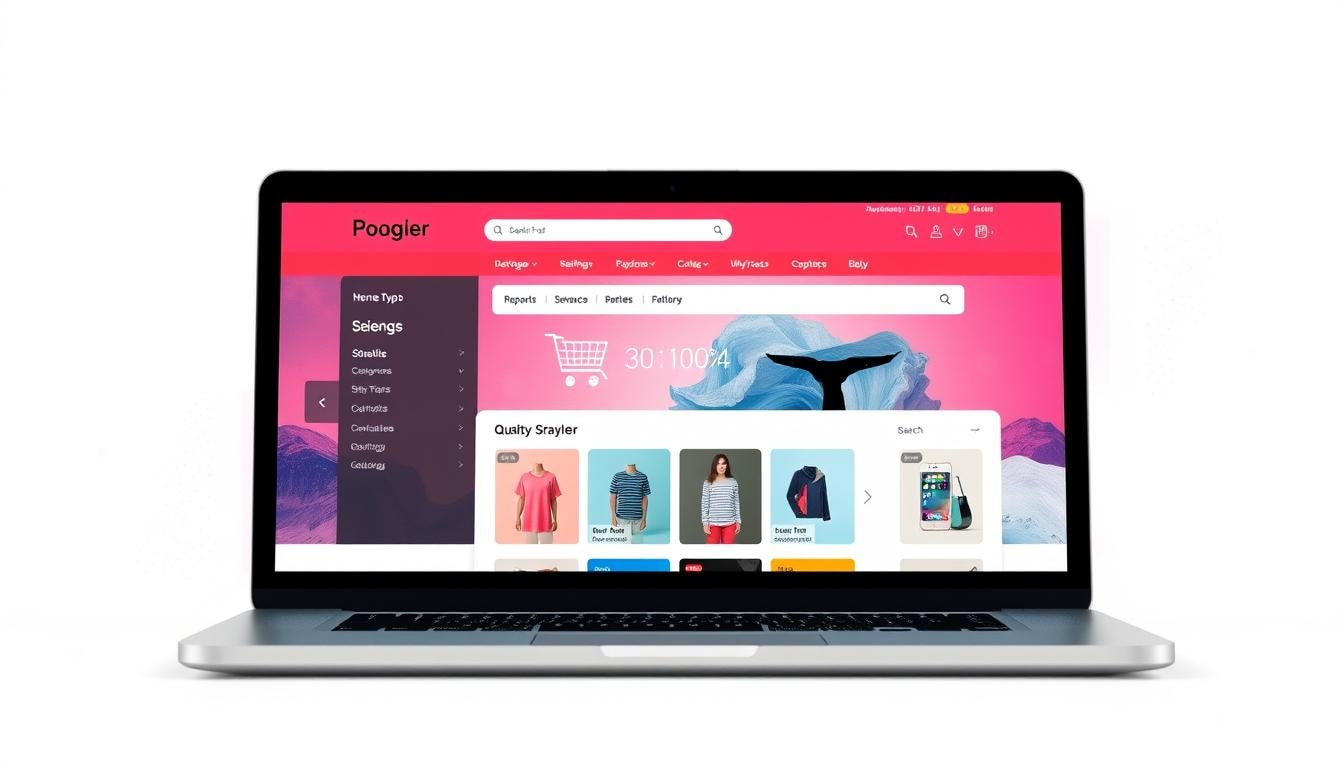Why 2024 is the Perfect Time to Start an Online Store Website
Why 2024 is the Perfect Time to Start an Online Store Website
Did you know the COVID-19 pandemic made e-commerce grow by 38%? This big jump has opened a great chance for entrepreneurs to start their online stores in 2024.
With more people working from home, using social media more, and easy website building tools, starting an online store is easier than ever.
Also, AI-powered tools, finding global talent, and easy product sourcing have made starting an online store simpler.
If you want to reach specific groups, use dropshipping, or use strong ecommerce platforms, now is the best time to do it.

Key Takeaways
- The COVID-19 pandemic has accelerated the growth of e-commerce, making 2024 an ideal time to start an online store website.
- Remote work, social media networking, and user-friendly website builders have lowered the barriers to entry for launching an online store.
- AI-powered tools, access to global talent, and streamlined product sourcing offer advantages for online entrepreneurs.
- Niche markets, dropshipping, and robust ecommerce platforms provide opportunities for differentiation and success.
- Leveraging the right tools and strategies can help online store owners thrive in the booming e-commerce landscape.
Harnessing the Power of AI
Starting an online store? Using AI can change the game for your business. AI tools are changing how we do things, from handling paperwork to making marketing materials.
AI-Powered Tools for Business Efficiency
Responsible AI means making smart systems that grow and help people in a good way. It's all about knowing where data comes from and how it's used, which helps make better choices.
With AI tools, you can make your business run smoother, automate boring tasks, and focus on big picture stuff.
AI can make your online store better in many ways, like managing stock and catching fraud.
Chatbots offer help all day, every day, and showing customers products they might like makes shopping better. AI can also help you set prices smartly, keeping you competitive.
AI-Generated Content and Ideas
AI doesn't just help with business tasks; it can also spark new ideas and create content. It can make content that's good for search engines, send emails just for you, and even make pictures and videos.
This saves time and makes sure your content hits the mark with your audience.
The eCommerce AI market is expected to grow a lot, reaching $45.72 billion by 2032.
With 42% of businesses trying AI for the first time in 2022, using AI can really set you apart in the online store world.
By using AI tools and creating content with AI, you can make your business run better, give customers a great experience, and stay ahead in the fast-changing online store world.
Remote Work Opportunities
The pandemic brought a big change, making remote work more common. Now, entrepreneurs can start and run online businesses from anywhere with good internet.
This flexibility lets them manage work and personal life better. They don't have to think about a physical store anymore.
Over 10 million job seekers have found remote work through FlexJobs. The company checks each job listing for quality, spending over 200 hours a day on it.
People using FlexJobs have found jobs with better pay and benefits. This shows how the platform is changing careers and improving lives worldwide.
Working remotely means doing virtual work from a computer without going to an office. Many jobs fit into this category. There's a big demand for flexible jobs that offer a better work-life balance.
FlexJobs gives unlimited help in finding remote jobs, including skill tests and webinars. Members share stories of finding work-from-home jobs in fields like accounting, customer service, graphic design, and marketing.

Telecommuting, or telework jobs, save time on commuting. They offer flexibility, less stress, and fewer interruptions. This leads to more productivity and a better work-life balance.
Freelance remote positions are also popular. They let people work on their own time and pick their projects.
Leveraging Social Media for Networking
Social media has become key for professional networking and finding business opportunities. With over 3.6 billion users, it's a big place for e-commerce growth.
It changes how brands connect with customers, building trust and helping e-commerce grow. Using these platforms can boost brand awareness, increase website visits, make customers loyal, and give insights for e-commerce.
LinkedIn for Professional Connections
LinkedIn has grown a lot since the pandemic, making it easier to meet potential partners and experts. It connects entrepreneurs with professionals worldwide, making remote work and networking easier.
Remote Collaboration Tools
Tools like Zoom and Microsoft Teams are key for working together online. They help entrepreneurs keep up professional relationships even when working from home. These tools help businesses stay connected and succeed in a changing work world.
- Instagram and Pinterest - Ideal for visually appealing products
- Facebook - Excellent for detailed product information and customer engagement
- Twitter - Suitable for quick updates, offers, and one-on-one customer service interactions
Using social media well can help a brand reach more people and connect with a wider audience.
Keeping a consistent look on social media helps people recognize the brand and keeps a professional image. Most people use social media on their phones, so making content easy to use on mobile is key.
Getting people involved with contests and sharing their own content can make them more engaged and create a brand community. It's important to track things like website traffic from social media and how well it converts to sales.
Social media ads let businesses target their ads well and use different types of ads to grow. By using social media and tools for working together online, entrepreneurs can make strong connections, keep customers loyal, and find new chances for growth.
"Effective social media utilization can expand a brand's reach by breaking down geographical barriers and connecting with a broader audience."
Freelance Marketplaces for Skill Acquisition
In today's fast-paced business world, freelance marketplaces are key for entrepreneurs to get the skills they need.
With the U.S. expecting 86.5 million freelancers by 2027, over half of the workforce will be freelancing. This means entrepreneurs can find a huge number of skilled professionals for their online stores.
Platforms like Fiverr offer many services, from making websites to creating short videos and illustrations. Upwork connects entrepreneurs with experts like civil engineers, lawyers, and financial advisors.
These sites make it easy for business owners to hire experts and improve their skills.
Websites like Behance are for creative fields, and FlexJobs is strict, like Upwork, offering many freelance options.
Freelancer.com and Guru have 800,000 employers worldwide and a huge network of freelancers, giving entrepreneurs lots of choices.
Toptal works with over 21,000 clients and picks only the best, letting in less than 3% of applicants each month. This means business owners can find top talent to improve their skills and outsource tasks.
Using these freelance marketplaces, entrepreneurs can explore a wide range of skills. They can find the expertise they need to succeed in the changing online retail world.

User-Friendly Website Building Tools
Website builders like Wix, Squarespace, and Hostinger have changed how we make online stores. They use no-code tools with drag-and-drop interfaces and templates.
This lets entrepreneurs make ecommerce websites without needing to know a lot about website design or hiring a web developer.
Wix Website Builder is a top choice, offering a free version with extra features for a 4.5 rating. It's great for those who want to build sites without paying monthly fees.
Duda Website Builder is for businesses, rated at 4.0, and Hostinger Website Builder also scores 4.0. It has AI tools and an easy drag-and-drop interface.
Bluehost Website Builder is rated at 4.0 and makes creating WordPress sites easy. It has a big library of templates and stock photos.
GoDaddy Websites + Marketing Builder, also rated at 4.0, offers sites that look good on desktop and mobile. It has unlimited storage and monthly data transfers, plus marketing and SEO tools.
Recent research says Wix is the best website builder in 2024 for its templates, ease, and price. It has over 800 templates and supports over 180 languages. It's easy to use, making it a favorite for both new and experienced entrepreneurs.
Wix has paid plans starting at $17 a month, but Hostinger is cheaper, starting at $2.49 a month. It offers similar features and AI tools.
Squarespace has nice templates but might not have all the tools and features Wix has.
Wix and Hostinger both offer free trials. Wix has a 14-day trial, and Hostinger has a 7-day free trial. This lets users try their services before deciding.
These website builders make it easy for entrepreneurs to create ecommerce websites without needing to code or hire a web developer.
Access to a Vast Talent Pool
The pandemic has caused many job losses, leaving a huge number of skilled people looking for work as freelance consultants.
Entrepreneurs can use this talent pool to find experts like graphic designers, marketers, or business advisors for their online stores.
Being able to hire remotely lets business owners create diverse teams. This way, they can find talent from all over the world and bring different skills and views together.
Hiring Freelance Consultants
Ecommerce businesses can give some tasks to their own teams and give others to outsourcing companies. These outsourcing companies offer many services like website development, design, and IT support.
By using freelance consultants, ecommerce owners can get a lot of specialized skills and solutions to help their online stores grow.
Building a Diverse Team
Online recruitment websites and freelance platforms give businesses a big chance to find IT talent. Outsourcing companies are great for giving businesses access to skilled teams that can grow or shrink as needed.
This lets ecommerce owners create diverse teams with different skills and ideas. This can lead to more innovation and success online.
Being able to find a vast talent pool and create diverse teams through remote hiring and freelance consultants is a big plus for ecommerce owners. By using these tools, they can get specialized skills, work more efficiently, and grow their online stores.

Online Store Website Opportunities
The global side hustle industry is expected to hit $14.39 billion by 2030. This shows a big chance for new entrepreneurs to start successful online businesses.
The move to digital commerce sped up by the pandemic has made it easier for new businesses to grow. More people are shopping online now.
Starting an online store is easier than ever, thanks to user-friendly website builders and strong retail trends.
Sites like Shopify, Shift4Shop, and Square Online have easy-to-use interfaces and powerful tools. They have high G2 ratings of 4.4/5, 3.9/5, and 4.2/5, respectively. Squarespace and BigCommerce also score well at 4.4/5 and 4.2/5 on G2.
These ecommerce opportunities offer different pricing, starting at $29 a month. With free and low-cost options like Shift4Shop's free plan and Wix's Business Basic at $29 a month, starting an online business is easier for many entrepreneurs.
Whether you're an experienced entrepreneur or new to digital commerce, there are many chances to start a successful online store. With the right tools and determination, you can make your business dreams come true.
Platform - G2 Rating - Pricing (Monthly)
- Shopify - 4.4/5⭐ - $29
- Shift4Shop - 3.9/5⭐ - $29
- Square Online - 4.2/5⭐ - $29
- Squarespace - 4.4/5⭐ - $28
- BigCommerce - 4.2/5⭐ - $29
- Wix - N/A⭐ - $29
- GoDaddy - N/A⭐ - $20.99
"The shift towards e-commerce, accelerated by the pandemic, has created a favorable environment for new businesses to thrive, as more consumers turn to online shopping for their needs."
Reaching Niche Markets
The digital world is always changing, and smart business owners are finding great success in niche markets.
These markets are all about focusing on specific groups of people. By understanding what these groups need and want, you can make products that really stand out and build a loyal customer base.
Identifying Niche Audiences
Knowing your target audience is key to doing well in niche markets. You need to dig into industry data to learn about your potential customers' lives and shopping habits.
More people are shopping online in these specialized areas, thanks to better technology and a desire for targeted shopping.
These online stores are quick to adapt to new trends and customer feedback, keeping them ahead in their markets. Use this info to make marketing plans and products that speak directly to your audience.
Tailoring Products and Services
After finding your niche, it's time to make your products fit their needs. Shopify is a top choice for these businesses because it offers customizable designs, good prices, and easy-to-use tools.
It also has a big app store with tools for better customer service, marketing, and managing your inventory.
Shopify's SEO and marketing help make your online store easy to find in crowded markets. With these tools, you can give your customers a shopping experience they'll love.
To connect with customers in niche eCommerce, offer personalized shopping, engaging content, loyalty programs, and a strong online presence.
Building a successful niche eCommerce site means knowing what your audience wants, checking out the competition, making a great website, using SEO tools, and linking with social media.
Niche Market Demand and Earning Potential
Telemedicine Physicians - As of January 2023, a search for "telemedicine physician" on Indeed yielded 58,157 job listings in the US, with salary estimates ranging from $100,000 to $255,000, indicating both high demand and high earning potential for this niche profession.
Publishing Industry - In September 2022, the publishing industry revenue reached $29.8 billion, a significant increase from $25.71 billion in 2020, showcasing growth and financial opportunities within this niche market.
Plus-Size Apparel - In 2022, only 9% of Fashion Week retailers offered clothing in a size 20 or above. StyleSage estimated that only 13% of products in the market were plus-sized in 2020. Sales revenue for women's plus-size apparel grew by 18% in 2021 compared to 2019, which was over three times faster than consumer spending on the remaining women's market.

By making your products fit the needs of your niche market, you can stand out and build a loyal customer base. They'll appreciate the personal touch you give them.
Streamlined Product Sourcing
In today's fast-paced business world, dropshipping and print-on-demand have changed how entrepreneurs source and manage products.
Retailers can make more than 50% profit by selling products from wholesalers. They get up to 40% off on products, which means higher profits.
Dropshipping for Inventory Management
Dropshipping lets business owners sell products without keeping inventory. The supplier takes care of shipping.
Apps like DSers help pick products for specific markets from AliExpress. Spocket offers up to 40% off on products with wholesale prices already set.
Print-on-Demand Services
Print-on-demand lets entrepreneurs sell custom products without the high costs of making and storing inventory. Printful offers customization for t-shirts, hats, and phone cases, making unique items for customers.
Platforms like Faire connect businesses with over 100,000 brands and makers. Syncee lists trustworthy suppliers worldwide, from baby items to fashion.
Creative Hub links businesses with artists for selling art and limited edition prints, offering high-end products.
Trade shows are great for networking and finding new products. They help entrepreneurs discover unique items to sell online.
Using dropshipping, print-on-demand, and many product platforms, online entrepreneurs can manage their inventory better. They can cut upfront costs and offer a wide range of products. This helps their business succeed in the future.
Robust eCommerce Platforms
Starting an online store? You'll need reliable and easy-to-use ecommerce platforms. Shopify, Wix, and WooCommerce are great for building, managing, and growing your online business. They offer tools to make your website look good and match your brand.
Store Builders and Design Options
Even if you're not tech-savvy, these platforms make it easy to start an online store. Shopify scores a 4.4 out of 5 on G2, and Wix and BigCommerce score 4.2. They have many templates and let you customize your store to fit your brand.
Integrated Marketing and Analytics
Good online stores have a nice website and use marketing tools and analytics to grow. Shopify, WooCommerce, and Adobe Commerce offer features to promote products and reach new customers. They help you make smart decisions by tracking important data.
With global retail ecommerce sales expected to hit $6 billion in 2024 and $8 billion by 2025, now is the perfect time to use ecommerce platforms to grow your business.
There are many options available, so you can find one that fits your needs and budget. This lets you create a successful online store.
Branding and Visual Identity
Starting an online store means you need a strong brand identity to stand out. Use tools and resources to make a brand that speaks to your audience and sets you apart.
Your brand's look is key. This includes a cool logo, a matching color scheme, and great product photos. These elements work together to make shopping better, grab attention, and share your brand's story.
For a brand that pops, do your homework on the market and trends. Find out what fonts, colors, and designs your customers like. A strong brand look builds recognition and loyalty.
A simple, flexible logo is a big part of your brand. Use tools like Canva or Shopify's logo maker to make one that fits your brand. Also, pick a color palette and typefaces that go together for your brand rules.
Keep your brand's look the same everywhere, from your site to social media. This makes your brand memorable and trustworthy. Putting effort into your brand's look boosts customer recognition and engagement. This leads to success for your online store.
Legal and Business Registration
Starting an online store means you must follow legal and business rules. This includes getting a business license, permits, and picking the right business type, like a sole proprietorship or LLC.
Doing this protects your personal stuff and makes your store look good to customers.
Licensing and Permits
Business licenses let you legally run your business in a certain area. Not having one can lead to fines or even closing your business.
You might need federal, industry, or local licenses, depending on what you do. Getting a federal tax ID is free, but other licenses have different costs and rules.
Business Structures
Entrepreneurs can choose from many business types, like LLCs or S corps. The type you pick affects taxes and how you're protected legally. Talking to a lawyer or accountant can help pick the best one for your store.
Legal stuff can be hard, but there are resources to help. Sites like LegalZoom and ZenBusiness make registering easier. Also, website builders like Wix and Hubspot offer tools to meet legal needs.
Remember, laws and rules change based on where you are and what you do. Always check the specific laws in your area and talk to the right people to make sure your store is legal and ready to go.
Conclusion
2024 is a great year for those wanting to start their own online stores. Technology has made it easier, remote work is common, and e-commerce is growing fast.
This makes it easier for entrepreneurs to jump into the digital world.
Using AI, finding freelance talent, and easy website builders can help create successful online businesses.
E-commerce lets you reach customers worldwide and focus on specific markets. It's a great way to make your business dreams come true.
Big names like Amazon, Alibaba, and eBay are changing retail with new tech. Mobile shopping is also getting bigger.
Now is the perfect time for entrepreneurs to make their mark online. With tools like Shopify, WooCommerce, BigCommerce, and Magento, and secure payment options like Stripe, starting a digital business is within reach.
Source Links
https://www.shopify.com/blog/start-online-store - How To Start an Online Store in 2024 (10-Step Guide) - Shopify
https://vtmit.vt.edu/academics/student-experience/blog/power-of-ai.html - Harness the Power of AI While Avoiding its Pitfalls
https://www.ecwid.com/blog/harnessing-ai-for-business.html - Harnessing AI for a Business: Practical Uses of AI in Ecommerce
https://www.wagento.com/wagento-way/7-ways-to-harnessing-the-power-of-ai-in-ecommerce/ - 7 ways to Harnessing the Power of AI in eCommerce
https://www.flexjobs.com/ - Best Remote Jobs, Work from Home Jobs, Online Jobs & More
https://goremotely.net/ - GoRemotely: Find the Best Remote Jobs in Any Industry!
https://www.linkedin.com/pulse/leveraging-social-media-platforms-drive-e-commerce-growth-rondre-silk-hx9ne - Leveraging Social Media Platforms to Drive E-commerce Growth
https://www.business.com/articles/10-top-sites-for-freelance-services/ - The Best Sites for Freelance Services
https://www.pcmag.com/picks/the-best-website-builders - The Best Website Builders for 2024
https://www.techradar.com/news/the-best-website-builder - Best website builders of 2024
https://www.shopify.com/blog/ecommerce-outsourcing - How To Use Ecommerce Outsourcing to Grow Your Online Store (2024) - Shopify
https://vggate.com/2024/05/24/navigating-the-it-talent-pool-finding-the-right-resources-for-your-project/ - Navigating the IT Talent Pool: Finding the Right Resources for Your Project - VGGate
https://www.shopify.com/blog/best-ecommerce-website-builder - 10 Best Ecommerce Website Builders for Your Online Store (2024) - Shopify
https://www.bigcommerce.com/articles/ecommerce/ - Ecommerce: The History and Future of Online Shopping
https://www.forbes.com/advisor/business/software/best-ecommerce-platform/ - Best E-Commerce Platforms Of 2024
https://instant.so/blog/how-niche-ecommerce-websites-attract-a-unique-audience - How niche eCommerce websites attract a unique audience | Instant
https://www.coursera.org/articles/niche-market - What Is a Niche Market? And How To Reach One
https://www.bazaarvoice.com/blog/how-to-reach-and-engage-with-your-niche-audience/ - How to reach and engage with your niche audience
https://www.shopify.com/blog/product-sourcing-apps - Product Sourcing Guide To Sell Online: How To Get Started (2024) - Shopify
https://www.shopify.com/blog/best-ecommerce-platforms - 11 Best Ecommerce Platforms for Your Business in 2024 - Shopify
https://www.bigcommerce.com/articles/ecommerce/ecommerce-platforms/ - 9 Best Ecommerce Platforms: Pros and Cons + Pricing Comparison
https://zapier.com/blog/best-ecommerce-shopping-cart-software/ - The 6 best eCommerce website building platforms in 2024 | Zapier
https://www.shopify.com/blog/how-to-diy-a-visual-brand - Stand out in the Market With Distinct Brand Identity Design (2024) - Shopify
https://pixolabo.com/visual-design-building-brand-identity-in-e-commerce/ - Visual Design: Key to Building Brand Identity in E-Commerce
https://www.shopify.com/blog/business-license - How to Get a Business License in 5 Simple Steps (2024) - Shopify
https://www.forbes.com/advisor/business/how-to-start-an-online-store/ - How To Start An Online Store In 8 Steps (2024 Guide)
https://www.emarketinginstitute.org/free-ebooks/e-commerce-for-beginners/chapter-16-conclusion/ - Chapter 16: Conclusion - eMarketing Institute
https://subscribed.fyi/blog/conclusion-of-e-commerce-summarizing-industry-impact/ - Conclusion of E-commerce: Summarizing Industry Impact - Subscribed.FYI



